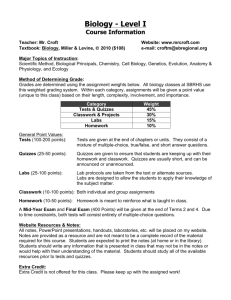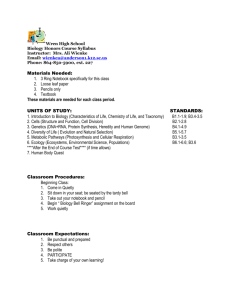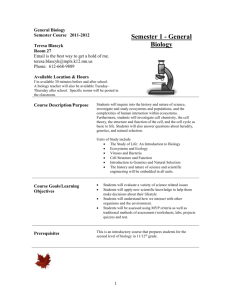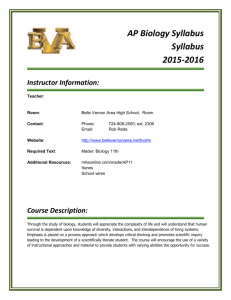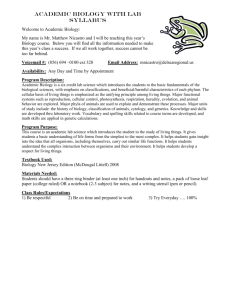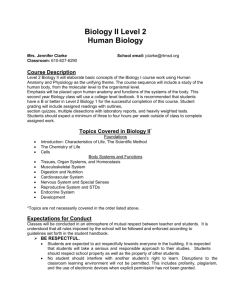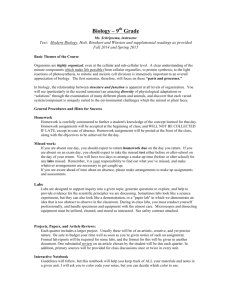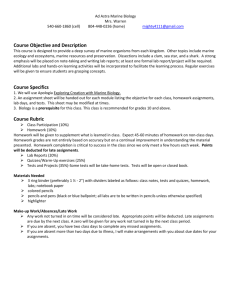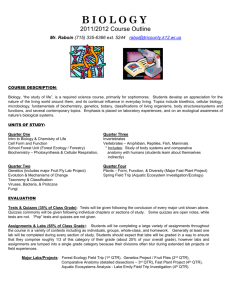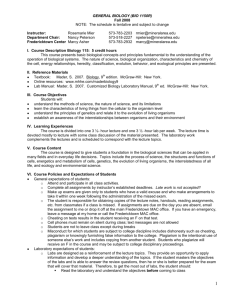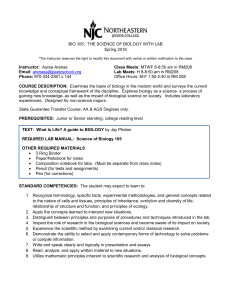BIOLOGY 1 G/T
advertisement
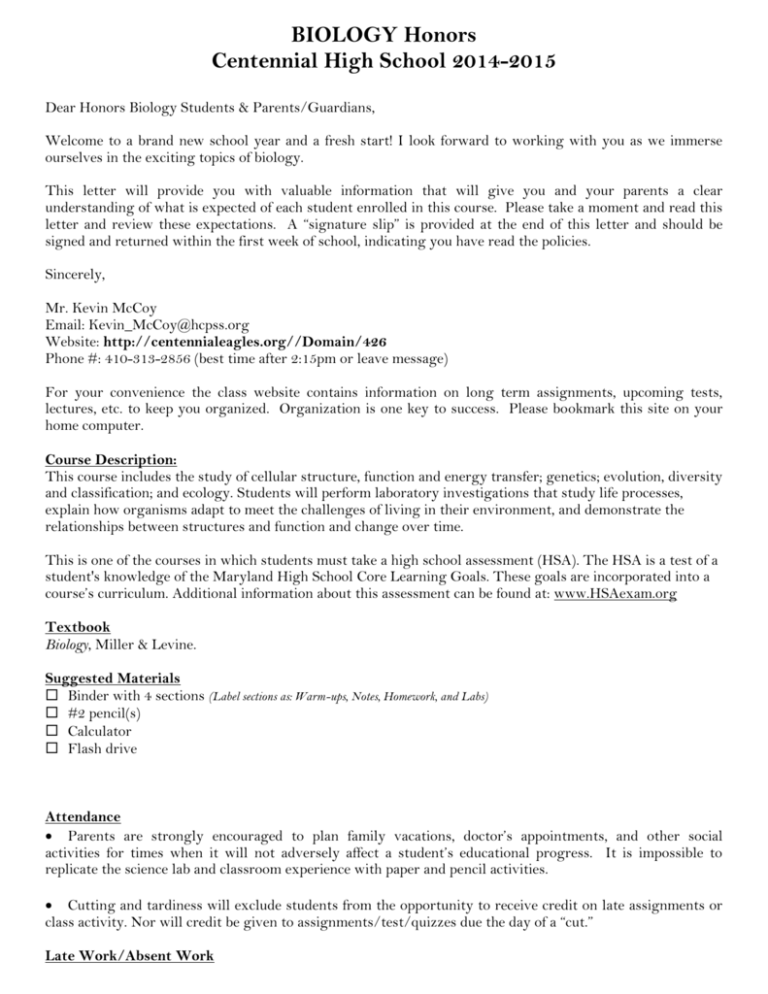
BIOLOGY Honors Centennial High School 2014-2015 Dear Honors Biology Students & Parents/Guardians, Welcome to a brand new school year and a fresh start! I look forward to working with you as we immerse ourselves in the exciting topics of biology. This letter will provide you with valuable information that will give you and your parents a clear understanding of what is expected of each student enrolled in this course. Please take a moment and read this letter and review these expectations. A “signature slip” is provided at the end of this letter and should be signed and returned within the first week of school, indicating you have read the policies. Sincerely, Mr. Kevin McCoy Email: Kevin_McCoy@hcpss.org Website: http://centennialeagles.org//Domain/426 Phone #: 410-313-2856 (best time after 2:15pm or leave message) For your convenience the class website contains information on long term assignments, upcoming tests, lectures, etc. to keep you organized. Organization is one key to success. Please bookmark this site on your home computer. Course Description: This course includes the study of cellular structure, function and energy transfer; genetics; evolution, diversity and classification; and ecology. Students will perform laboratory investigations that study life processes, explain how organisms adapt to meet the challenges of living in their environment, and demonstrate the relationships between structures and function and change over time. This is one of the courses in which students must take a high school assessment (HSA). The HSA is a test of a student's knowledge of the Maryland High School Core Learning Goals. These goals are incorporated into a course’s curriculum. Additional information about this assessment can be found at: www.HSAexam.org Textbook Biology, Miller & Levine. Suggested Materials Binder with 4 sections (Label sections as: Warm-ups, Notes, Homework, and Labs) #2 pencil(s) Calculator Flash drive Attendance Parents are strongly encouraged to plan family vacations, doctor’s appointments, and other social activities for times when it will not adversely affect a student’s educational progress. It is impossible to replicate the science lab and classroom experience with paper and pencil activities. Cutting and tardiness will exclude students from the opportunity to receive credit on late assignments or class activity. Nor will credit be given to assignments/test/quizzes due the day of a “cut.” Late Work/Absent Work All work is due when assigned. Any postponements must be worked out in advance. No late work will be accepted regardless of the assignment. Assignments must be turned in to the teacher before or during the students’ class period. If a student has missed class due to another event in the building they are still responsible for turning in any work that was due that day. If the student fails to turn the work in it will be considered late and will not be accepted! Missed tests are to be made up within 3 days unless extraordinary circumstances exist. The exams must be made up at lunch, before, or after school. It is the student’s responsibility to make up the missed exam. Missed labs will be made up after school, on lab make up days (TBA). All labs must be performed – no dry lab data collection will be accepted (this means you may NOT collect data from another person). If work was assigned before your absence, absent work is due on the day you return. Work assigned during your absence is due to the Make-up work bin within 5 days of your return, unless mutually agreed on by the teacher and student. It is the responsibility of the student to check the make-up book for missed assignments and any handouts, seek clarification if confused and to make up missed laboratory work, tests and quizzes by arrangement within one week or no credit will be given. NOTE: alternate quizzes and tests will/may be given for students who miss test dates. Extra Help Sessions Students are encouraged to ask for extra help after or before school. This time can be used to go over course material (labs, homework, classwork, etc.), make up work due to an absence, or discuss any biology topics in more detail. Student’s who come for help must have their notebook and textbook with them. Grading Policy Grades will be given on a quarterly basis according to the following scale: A B C D E 89.5 - 100 79.5 - 89.4 69.5 - 79.4 59.5 - 69.4 below 59.4 Grades will be based on classwork, homework assignments, class participation, labs, and unit tests and quizzes. Daily participation and attendance is also an important part of the grade. Classwork, Participation, Homework - 20% Chapter tests and quizzes - 40% Labs and Projects - 40% An online grade book, through Aspen, will be maintained for students. Students are encouraged to check their grade regularly in order to off set any grade issues that may arise at the end of each quarter. Lab Assignments There will be many lab activities throughout the course of the year. It is very important that you are present in class on lab days, as labs are very complicated to make up. Participation Everyday participation will be taken into account. There will 2 possible points daily, 10 points a week. It will not be based on how many times a student raises their hand or if they answer the most questions correctly. The points will be based on how engaged a student is in the class. A student that is on task doing their assignments and not being disruptive will receive the 2 points. If a student is being disruptive they may only receive a 1 or 2. Any student that sleeps at any time or any time a student uses an unauthorized electronic device in the class they will lose the 2 points. At the end of every week the assignment will be posted on Aspen with a note if there is any reason why they have lost any points. Quarter Extra Credit An Article Review may be turned in for extra credit (10 points). All articles must be related to Biology and not be more than 3 years old. Each student has the opportunity to complete an article review once per quarter. The Article Review write-up requires a summary and reflection of the article, 1-2 typed pages double spaced, 12pt font. Grades are based on your understanding of the article and ability to express your understanding in writing. (Yes, spelling and grammar count.). Extra credit is due 5 school days before the end of the quarter (see calendar). Please include the following: Authors Name (s), "Title of Article", Publication Title, Date, Volume, and Page Numbers. (a copy of the article must be attached) Academic Dishonesty Academic dishonesty is defined as cheating of any kind, including misrepresenting one's own work, taking credit for the work of others without crediting them and without appropriate authorization, and the fabrication of information. Common examples of academically dishonest behavior include, but are not limited to, the following: 1. Cheating - intentionally using or attempting to use unauthorized materials to improve one's grade; copying from another student's work; submitting same work for an assignment in more than one class without prior permission of both instructors; representing material prepared by another as one's own work; inappropriate test taking conduct; violating rules of academic conduct relating to this course. 2. Fabrication - intentional and unauthorized falsification or invention of any data, information, or citation in an academic exercise. 3. Plagiarism - intentionally representing the words, ideas, or sequences of ideas of another, as one's own in any academic exercise; failure to attribute any of the following: quotations, paraphrases, or borrowed information. 4. Falsification and forgery - knowingly making a false statement, concealing material information or forging another's signature. 5. Facilitating academic dishonesty - intentionally or knowingly helping or attempting to help another to commit an act of academic dishonesty. 6. Use of cellular phones, text messaging- use of this current technological advance during an exam will result in a zero test score. Any of the infractions mentioned in this section will result in a discipline notice to the appropriate assistant principal. All rules and policies in the Centennial High School Student Handbook and the HCPSS Secondary Student Handbook will apply if not addressed in this class policy. STUDENT/PARENT HONORS BIOLOGY CONTRACT STUDENT FORM I _______________________________________ have read the course syllabus and (Print Student Name) understand what is required of me in this course _____________________________________ Date ____________ (Student Signature) Student e-mail __________________________________ PARENT FORM I _______________________________________ the parent/guardian of (Print Parent Name) ________________________________________ have read the course syllabus and (Print Student Name) understand what is required of my child in this course. _____________________________________ Date ____________ (Parent/Guardian Signature) Parent e-mail __________________________________ phone number _____________________ (work / home)
